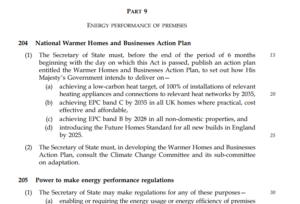What is the Energy Security Bill and how does it impact EPCs?
The Department for Energy, Security & Net Zero (DESNZ) introduced the Energy Security Bill (now known as the Energy Bill) to Parliament in July 2022. The aim of the bill is to usher in a cleaner, more cost-effective, and secure energy infrastructure in England and Wales. As time marches forward, significant strides have been made, and the Bill has successfully advanced through the House of Lords. There is mounting excitement and optimism, that the Bill could soon be passed into law.

What does the Energy Security Bill cover?
The new Energy Security Bill is extremely wide ranging and covers an enormous amount of regulations including, but not limited to energy production, security, carbon capture, heat networks smart metering, and vitally for our industry the law surrounding the production of Energy Performance Certificates (EPCs), Display Energy Certificates (DEC) and Air Conditioning Inspection Reports (ACIR).
As recently reported, the strengthening of the Energy Savings Opportunity Scheme (ESOS) is also included within the Bill, and phase 3 of the scheme has since been extended to allow for proposed changes to the scheme to become law.
How will the Bill affect production of energy certificates?
The government understands the importance of the Energy Performance of Buildings (EPB) Framework and its role in helping the UK to achieve its net zero carbon targets by 2050: “The framework will need to play an increasingly important role if the UK is to achieve its target for net-zero greenhouse gas emissions by 2050. Energy Certificates including Energy Performance Certificates (EPCs) provide consumers, building owners and occupiers and third parties with information on the performance of the building stock and support effective decisions on improving the energy efficiency of buildings.”
Power to make energy performance regulations
Following the UKs departure from the EU, the EPB regulations 2012 which govern the production of energy certificates was covered by a great repeal bill, which enshrined these regulations in UK law. This effectively bought time for the government to create new primary powers for EPB Regulations.
The powers in the Bill will allow these requirements to be copied or amended in new regulations, to ensure that they are fit for purpose and reflects the UK’s ambitions on climate change. This would cover the following areas:
- EPC trigger points
- EPC validity period
- Role of Energy Assessors
- The information that EPCs provide
- Requirements for the EPC to be calculated according to a government approved calculation method.
The EPC Action Plan highlighted the government’s intent to make changes to trigger points and validity periods and to clarify existing exemptions from requirements. Once the bill has been passed, the government will consult on any proposals for change in its planned consultation.
Power to amend Civil Penalties
The levels of penalty charges for not having a legally valid energy certificate were set In 2007, 16 years ago, and have not been amended since. Once the bill is passed, the government is considering amendments to civil penalties, subject to consultation, that are proportionate and reflective of the changes to the EPB regime since 2007.
National Warmer Homes and Businesses Action Plan
Once the bill has been passed the government will be given 6 months to publish an action plan entitled the Warmer Homes and Businesses Action Plan, which will outline how the government intends to deliver on the following areas:
- Achieving a low-carbon heat target, of 100% of installations of relevant heating appliances and connections to relevant heat networks by 2035,
- Achieving EPC band C by 2035 in all UK homes where practical, cost effective and affordable,
- Achieving EPC band B by 2028 in all non-domestic properties, and introducing the Future Homes Standard for all new builds in England

Elmhurst Energy Managing Director, Stuart Fairlie, comments; “We are delighted to see the Energy Security Bill march through the various stages of parliamentary oversight. This update will support both DLUHC and DESNZ ambitions to improve the infrastructure surrounding Energy Certificates; the new regulations we have been informed will be also help the drive to keep pushing of the Governments EPC Action plan to better deliver Energy Certificates for all UK buildings.”
For further information, please see below:
